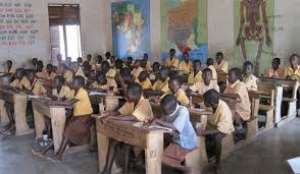
Crucial to the realization of inclusive and equitable quality education and promotion of lifelong learning opportunities for all (SDG 4) is decentralized participation involving community members and other important stakeholders.
Education is among the top priorities by governments across the world. In the United States, both Policy reform advocates and Politicians are concerned about how to revive and enrich public education to maintain economic competitiveness and world influence. In china, efforts to consolidate status as the world’s manufacturing hub has received considerable support through significant education reform and investment. In Ghana, the discussion is gradually migrating from getting more people into school to improving the quality of the learning experience.
The task to ensure quality outcomes and quality investment into critical areas at the basic, secondary, technical, vocational and tertiary educational levels is however beyond the government; hence the need for community ownership and participation in facilitating a successful educational reform in the country.
VIAM Africa Center for Education and Social Policy undertook a consultation exercise on behalf of the Education Commission, a global initiative under the chairmanship of Gordon Brown, United Nations Special Envoy for Global Education. VIAM organize sessions in selected communities in Accra, the capital city of Ghana to gather input of key education stakeholders, including technocrats, policy makers, relevant stakeholders and consumers of education, around stipulated research questions to support the Commission’s development of a strong and comprehensive final report. This falls in line with VIAM’s commitment to serve as a resource for government departments and agencies, education institutions, philanthropic foundations and others committed to improving access, quality and management issues in education.
Over 50 people participated in this exercise. Consultation sessions were held at three different locations; first two sessions in the afternoon and the last session in the evening. These locations were of close proximity to the settlement of participants. Each session began with an overview of the Commission’s work as required, after which discussions around key questions began. Owing to differences in literacy among participants, some of the discussion questions had to be rephrased in a language semi-literate and illiterate participants can understand. Questions were also translated into the main local dialects for some participants to understand (Ga, Twi, and Ewe).
From my interactions with participants, I observed that parents and guardians are very much interested in the education of their children. For some, it is an issue of giving their children a privilege they never had. For others, it is about preparing their children for future demands and opportunities. Their interest is however constrained by socio-cultural and economic factors.
Unemployment, poor family planning, broken homes as a result of divorce, among others are some reasons parents find it difficult to educate their children. A more dangerous constraint is skepticism at the importance of education due to the prevailing condition of graduate unemployment; “what is the point of spending millions of cedis educating my child, only for her to graduate and sit at home because there is no job”, a parent lamented. This however is an expression of frustration, than an outright devaluation of education.
According to participants, poor community involvement, backward socio-cultural norms, outdated curriculum, bad economy, poor parental supervision, to mention a few, are obstacles to raising educational quality in Ghana.
14 years from now, participants project school fees will skyrocket beyond the reach of parents, confidence in public schools will plummet, private schools would outnumber public ones, technical and vocational education will gain momentum, and wholesale education finance for both the rich and the poor will cease.
Education finance remains a vexed and contentious matter. The discussion on the extent to which government, the private sector and parents should be financially involved is useful for building consensus and deploying much needed reforms. Just as important is the involvement of those at the bottom of the pyramid which comprises consumers of public education, mostly the poor, in the discussion. Also, the skepticism and negativity can be put to rest if requisite reforms and financially viable alternatives for the funding of public schools are developed and implemented.
Ernest Armah is the Programmes Manager of VIAM Africa Centre for Education and Social Policy. Contact: [email protected]




 Let’s be true believers, not just church goers – Catholic Priest to Christians
Let’s be true believers, not just church goers – Catholic Priest to Christians
 Ejisu by-election: "We don’t need an independent candidate" — Akufo-Addo fights ...
Ejisu by-election: "We don’t need an independent candidate" — Akufo-Addo fights ...
 Election 2024: Bawumia dares Mahama to two-man debate as he starts countrywide t...
Election 2024: Bawumia dares Mahama to two-man debate as he starts countrywide t...
 'Borla' BVDs: 'Why would anyone want to buy 10 used biometric devices 'hard-code...
'Borla' BVDs: 'Why would anyone want to buy 10 used biometric devices 'hard-code...
 Professor Jane Naana pays last respect to Modestus Ahiable
Professor Jane Naana pays last respect to Modestus Ahiable
 IT is a major skill needed for the job market - Industry Players
IT is a major skill needed for the job market - Industry Players
 Nungua Traditional Council performs “Jenten Nishwamo” ahead of Homowo
Nungua Traditional Council performs “Jenten Nishwamo” ahead of Homowo
 Tema residents demand end of dumsor
Tema residents demand end of dumsor
 A vote for Owusu Aduomi is a vote gor NDC – Bawumia tells Ejisu residents
A vote for Owusu Aduomi is a vote gor NDC – Bawumia tells Ejisu residents
 S. Africa's ex-president Zuma makes surprise comeback
S. Africa's ex-president Zuma makes surprise comeback
